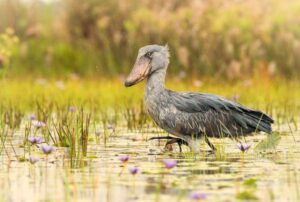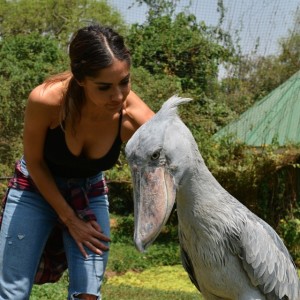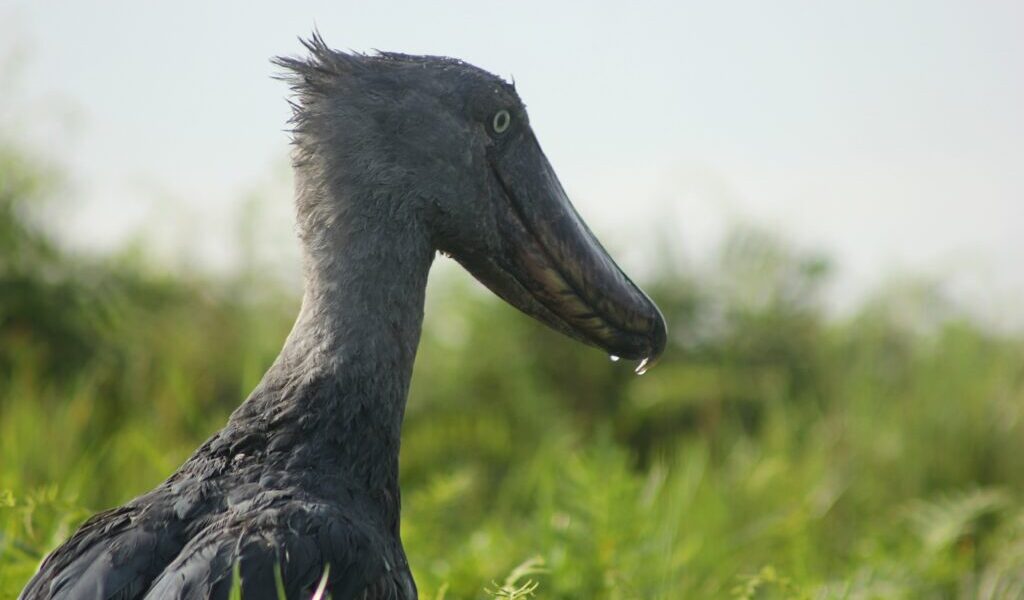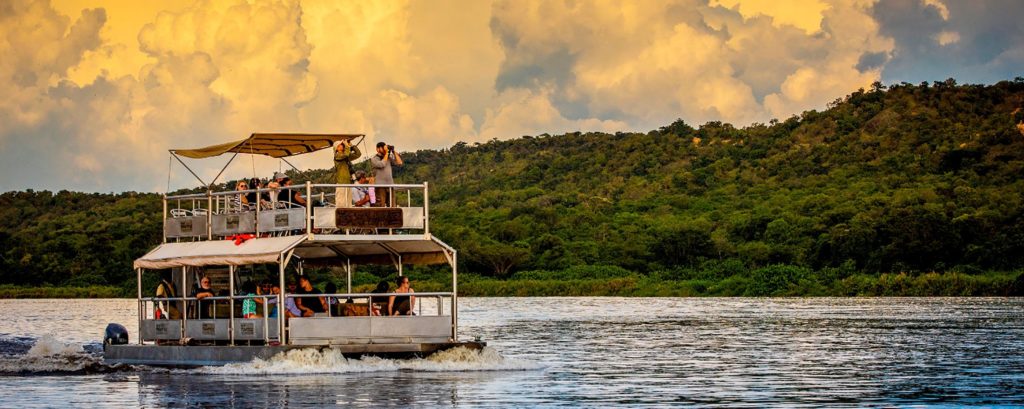Want to see the giant elusive shoebill Stork in Uganda? Realm Africa Safaris™ organizes daily Shoebill Tours in Uganda. Our trips visit the most pristine locations that are habitats of the largely rare shoebill stork. Among these include; the Mabamba Swamp on Lake Victoria, the Lugogo Swamp inside the Zziwa Rhino Sanctuary, the Nile Delta in Murchison Falls National Park, and many others as we have discussed below.
Top Locations for Shoebill Tours in Uganda
Shoebill Tracking In Murchison Falls National Park is done at the Delta area – where the Nile divides into Lake Albert and the Albert Nile – continuing north through Sudan into the Mediterranean Sea.
While the delta area is popular for shoebill tracking, it is also home to a variety of other beautiful Ugandan birds. While the delta area in Murchison Falls National park can be visited by car, the best way to visit and increase your chances of spotting the shoebill stork is by boat. We like to book our trips with Wild frontiers Uganda – a reputable boating/safari company that has been operating perhaps the most safe trips on Ugandan lakes & rivers.
Travel Planners Digest: Alternatively, one can opt to take the boat trip one way to track the shoebill, hop off, and join their private guide on a safari through the savannah plains of the gigantic Murchison Falls National Park.
** Taking a boat safari (one way) requires proper planning (speak to us about this). A packed lunch is recommended, and your private guide must be informed to wait for you at the delta area. If booked with Realm Africa Safaris™, we take care of all this!
-
- Read More about Shoebill Tracking In Murchison Falls National Park.
- Check out our popular Murchison Falls Safaris.

Seated on the mighty Lake Victoria – the world’s second-largest lake after Lake Superior, Mabamba Swamp is home to the vulnerable shoebill Stork. Mabamba Swamp is easily accessed from Entebbe using a traditional motorised canoe. Although shoebill tracking in the Mabamba swamp can be done both in the morning and afternoon, we have a preference for tracking In the morning when the temperatures are cool. The best time to track the shoebill in Mabamba Swamp is in the dry season from January-March
-
- Read More about Shoebill tracking in Mabamba Swamp.
- See Our 01 Day Shoebill Tour into Mabamba Swamp.
Located approximately 4 hours from Kampala, Lake Mburo National Park is another interesting park for people seeking to see the rare shoebill Stork in Uganda.
-
- Read More about shoebill tracking In Lake Mburo National Park.
- See our 03 Days Lake Mburo Safari including shoebill tracking
-
Toro-Semuliki Reserve
Toro-Semuliki game reserve is Uganda’s bird sanctuary with well Over 400 bird species including the shoebill stork. The park is located in Southwestern Uganda and can be accessed from Fort Portal Town.
The Best time to visit the Toro-Semuliki reserve for birdwatching is March, just after the relatively dry season from December to February. This time is also the breeding time for most bird species.
-
- Read More about Shoebill Tracking in the Toro-Semuliki reserve
- Check out our popular Uganda Safaris in Toro-semuliki Reserve.
Makanaga Swamp is a good place to spot shoebills. It’s roughly a 60km drive from Entebbe, accessed via Kampala–Masaka Rd, taking the road down from Kamengo trading centre. Makanaga is less visited compared to Mabamba Swamp. This, therefore, makes Makanaga the best place to visit for very intent birders who love to go to less crowded sites.
-
Lwera Swamp
Lwera Swamp en route to the western part of Uganda; Queen Elizabeth NP, Bwindi Forest NP & Lake Mburo National Park – is a good place to spot the shoebill. Although the chances here are slim, the sighting is getting very common these days. Your guide will often stop to speak to a few fellow guides or local folks to find out if there have been any Sightings.
-
Ishasha Sector ( Queen Elizabeth NP)
Though popular for the tree climbing Lions, the Ishasha sector of Queen Elizabeth NP has more to offer. Travellers can indulge in Shoebill tracking along the Marsh-filled Lake Edward shores. Besides tracking down the elusive shoebill stork, one can enjoy “remote” game-viewing experiences as this part Of the park is often skipped by Many tour operators. We love to take our clients to authentic places like Ishasha.
Things to see & do In Ishasha Sector of Queen Elizabeth NP
Accessible through the Zziwa Rhino Sanctuary, the Lugogo swamp is among the top 09 places to indulge in Shoebill tracking In Uganda.
A visit to Lugogo Swamp for shoebill tracking can easily be combined with Rhino Tracking at Zziwa, Chimpanzee tracking in Budongo Forest, Shoebill tracking In Murchison Falls, a boat safari to the falls and a game viewing safari in Murchison Falls National Park.
-
- Read more about Shoebill tracking In Lugogo Swamp Inside Zziwa Rhino Sanctuary.
- Check out our Popular 4-Day Murchison Falls Safari with a visit to Zziwa Rhino Sanctuary.

Originally known as Entebbe Zoo, the present-day Uganda Wildlife Education Centre is a rehabilitation centre for rescued animals recovered from poachers and traffickers. Among these living onsite is the rare shoebill Stork.
The shoebill at UWEC is fairly tame and is very welcoming to her guests – the kids love to visit the shoebill exhibit. Check out Top 10 Kidfriendly things to do in Uganda.
For adults, a visit to the UWEC (zoo) will give you a proper insight into what Uganda has to offer regarding wildlife. You can also Indulge in our favourite “Behind-the-scenes experience” a guided tour that gets you up close and personal with wildlife at UWEC.
When is the best time to plan or book Shoebill tracking tours in Uganda?
The best time of the year to book a shoebill tracking tour in Uganda is during the drier season months of December to February and June to August.
Uganda generally has two wet seasons and two dry seasons, with dry seasons being from December to February and June to August, while wet seasons are from March to May and September to November. March to May is wetter and warmer, while December to February is hotter and drier and it can sometimes get as hot as 96.8°F.
- Learn more about the Climate of Uganda.



